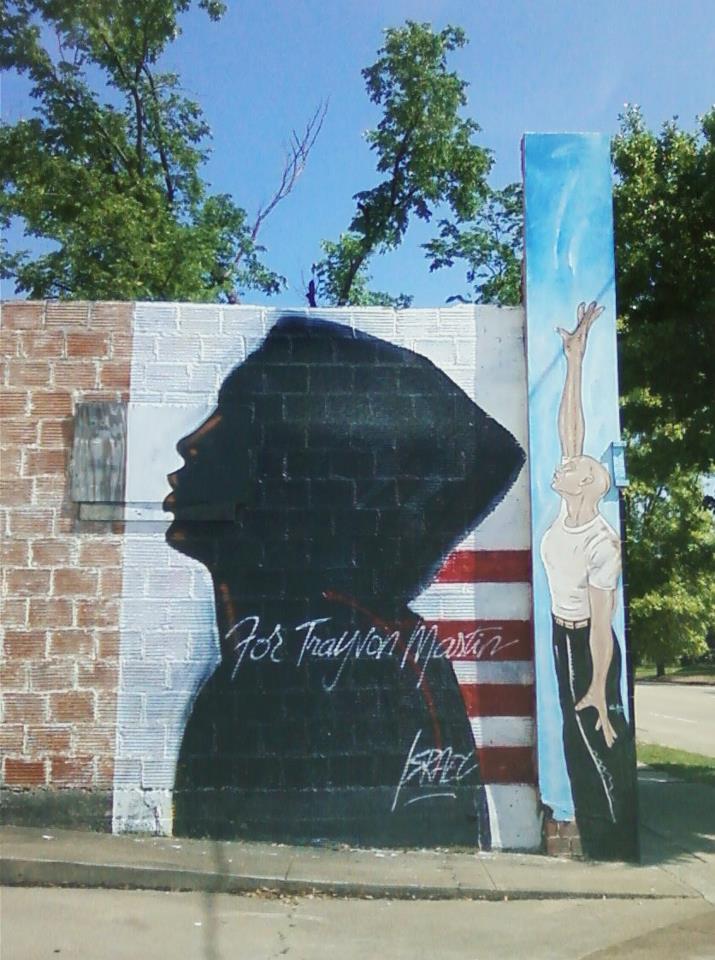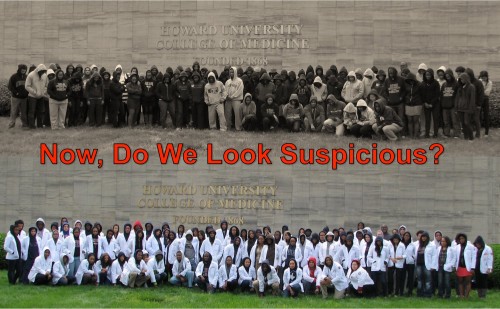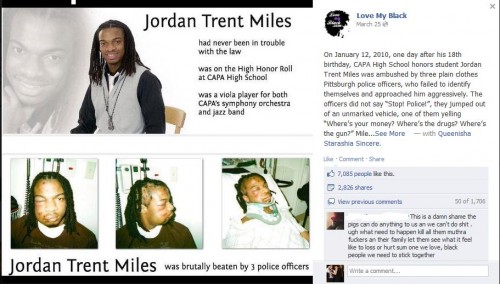
On February 26, 2012 Trayvon Martin, a Black, 17 a year old, unarmed, high school student, was shot and killed by George Zimmerman, a White Hispanic man acting in the self-appointed position of neighborhood watch captain (click here for more details).
The case has become a symbolic battle ground for two important issues: gun laws and racism. Although both of these issues are inextricably entwined, for purposes of simplicity, I will focus here only on the issue of race.
As Jessie Daniels importantly points out on Racism Review, battles over racism have shifted into the realm of social media, where digital and physical race relations persist in an augmented relationship. We see this in both the progressive anti-racist discourses, and the racial smear campaigns surrounding the Martin/Zimmerman case.
Although it is important to expose the overtly racist tactics utilized by some of Zimmerman’s defenders—of which there are plenty—I want to talk here about a more subtle, and so perhaps more problematic form of racial discourse. Specifically, I will talk about how a prominent strategy of protest—coming out of the liberal left—may inadvertently perpetuate, rather than challenge, racial hierarchies in their most dehumanizing form.
The tactic of which I speak is one that has made the rounds on my own Facebook Newsfeed, and one in which I—prior to more critical thought—actively participated. I am talking about the images and texts that couple Black bodies with prestigious social positions, and ask viewers/readers to problematize the racialized assumptions that often lead to faulty first impressions—which in turn lead to physical danger for the racialized subject. This tactic comes in two forms: political memes and case examples.
The memes, such as the one pictured below, are direct and general. They argue that Black bodies are assumed dangerous unless proven otherwise. In the case of this specific meme, they warn us that we might, in our assumptive haste, treat a doctor as a criminal purely based on the color of hir skin.

The case examples, such as the one pictured below, are more in depth, but accomplish a similar task. They picture a clean-cut, male, Black, body. They list his credentials, and then tell the tragic tale of his physical abuse at the hands of scared, racist, white, figures of authority.

Activists who use these memes and case examples strategically link them to Trayvon Martin’s story, highlighting his clean record and child-like face. This protest tactic honors Martin (and other Black boys and men who have been hurt because of a racist culture). It also spotlights the problematic racialized lens with which Americans largely operate. Further, and let me be clear, both forms of this protest tactic tell an empirically accurate story. The messages of the memes and case examples are not incorrect. Martin’s death, just like Jordan Trent Miles beating, is absolutely linked to race. The presence of Martin’s Black male body in a public space was enough to elicit Zimmerman’s suspicion, which resulted in a child’s death.
Simultaneously, however, the memes and case examples are gross oversimplifications with insidious consequences. As they are presented, these oversimplified protest tools perpetuate oppressive hierarches that lie at the intersection race and class. Specifically, they work to differentiate the “good” from the “bad” kind of racial minority—and imply that the life of the former is somehow more valuable than the life of the latter.
As in the case of Jordan Trent Miles, we are warned that our racial assumptions may lead to the wrongful and tragic harm of a “good” racial minority—reinforcing the devaluation of poor, under-educated, ghetto-dwelling, over-policed and under-protected, people of color. Indeed, as the left vehemently fights against accusations that Trayvon Martin sold drugs, we forget to ask: “SO WHAT IF HE DID!?” Would he somehow be less human? Would his murder be less atrocious? Would his family feel less pain? As the left justifiably decries the invasive and accusative investigations into Trayvon’s life, their (our) protest tactics effectively present the opposite side of the same coin.
The empirical reality of Blackness in America is that it often intersects with poverty, which in turn, intersects with crime. A poor Black man with a criminal record is an artifact of a deeply embedded racial system. The memes and case examples discussed above perpetuate the devaluation of the Poor Black subject, marginalizing him against those who are upwardly mobile. In utilizing this protest tactic we remain on the surface, failing to penetrate the grittier realities of race in America that led George Zimmerman to perceive an anonymous, unarmed, Black boy as a threat. As a result, we not only ignore these realities, but become silently, dangerously, and naively complicit in their reproduction.

Comments 14
ryan — April 3, 2012
that is a good point, for sure. but this has happened before where black bodies were seen as something other than they were, just bodies in the public doing public things....see the ACLU's case in Tulia Texas, where a large number of the black population was arrested and charged with drug related crimes, later to find out that none were involved. In fact, it was the arresting members who "put" this context onto the bodies themselves. SO what i am saying in dialogue with you is that the narrative is there, regardless if the reality follows.
see: http://www.aclu.org/national-security/racist-arrests-tulia-texas
you make the good points, as always : )
ryan — April 3, 2012
and in fact, i worked on this case as the president of the west texas ACLU at the time....if you want more info.....
David Banks — April 3, 2012
This is a great post Jenny, and you're critique is spot-on. I think this is part of (but by no means wholly caused by) the compartmentalization of political activity. The fact that people can say "I work to end gun violence" and I have a general sense of what kinds of political work they do, is actually pretty incredible. Unfortunately, this means I can be really ignorant of topics that are very important to my cause but I do not readily associate as part of my struggle. The "right" has done a much better job of this by making connections between what they see as problems. That's partially why you'll see people who are fiscally conservative also back socially conservative agendas. They can tell you how the two things are connected. It might be factually wrong or totally fabricated, but the important thing is that they can see a larger picture.
Your post highlights what we miss when we get wrapped up in one particular facet of the problem. We start to implicitly condone the vigilante shooting of suspected drug dealers. The problems are bigger and deeper than we are usually ready to admit.
JohnQ — April 3, 2012
This piece was spot on. It brings greater complexity to the identity politics involved. I will ask my students to read it for an upcoming class.
Jenny Davis — April 3, 2012
Thanks DB and John!!
DB-Great point about the tactics of the right. We must keep a bigger picture in mind (and in policy)
Jenni M. — April 4, 2012
Excellent critique, Jenny... I would add to your last paragraph that the supposed "criminality" of black and brown people is established not just because of their disproportionate poverty, but is (as ryan seems to be alluding to above) in and of itself a product of that criminalization. That is, the social structure is set up to produce outcomes that confirm racist stereotypes and reaffirm ideologies. We know that this occurs at every stage of the criminal justice system - e.g., from the way laws are constructed, to the over-policing of black and brown bodies and communities, to the way juries are selected, to the disproportionate disenfranchisement of black and brown felons, etc.
EMJ — April 4, 2012
Thought-provoking post. I'm reminded of John McCain's response when someone in one of his audiences suggested that Obama was Arabic: "No, ma'am. He's a decent, family man, a citizen that I just happen to have disagreements with." A surface truth about an individual (Obama is not an Arab) is emphasized at the expense of a deeper truth about the worth of other groups (there is nothing wrong with being an Arab).
Trayvon Martin: The Mistake of the Progressive Left » Sociological Images — April 5, 2012
[...] Cross-posted from cyborgology. [...]
David T. Macknet — April 6, 2012
A truly interesting post, and one which has me thinking about the issues, which is the point, I guess.
I do wish that you'd provided some support for your arguments in the third-to-last and second-to-last paragraphs, however, as you make some bald statements which are difficult to believe without some form of evidence backing them up.
I do not disagree with the points you've made, but just think that the points should be better supported with some evidence.